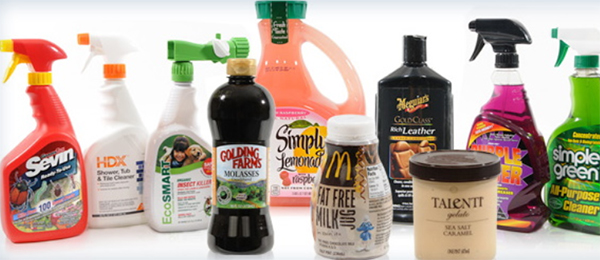GUIDE TO PLASTIC RESINS

High Density Polyethylene (HDPE) is the most widely used resin for extrusion blown plastic bottles. This material is economical, impact resistant, and provides a good moisture barrier. HDPE is compatible with a wide range of products including acids and caustics but is not compatible with solvents. It is usually supplied in FDA approved food grade. HDPE is naturally translucent and flexible. The addition of color will make HDPE opaque although not glossy. Adding extra weight to the bottle will yield a rigid container. HDPE can be supplied electro-treated or flame-treated by request so that it can be ready for silk screen decoration. While HDPE provides good protection at below freezing temperatures, it cannot be used with products filled at over 180°F or products requiring a hermetic seal. A glossy surface can be achieved with the use of the special copolymer resin, High Gloss HDPE.
Post Consumer Resin (PCR) is a blend of reclaimed natural HDPE (primarily from milk and water containers) and virgin resin. The recycled material is cleaned, ground and recompounded into uniform pellets along with prime virgin material especially designed to build up environmental stress crack resistance. PCR has no odor but exhibits a slight yellow tint in its natural state. This tint can be hidden by the addition of color. PCR is easily processed and inexpensive. However, it cannot come into direct contact with food or pharmaceutical products. PCR can be produced in a variety of recycled content percentages up to 100%.
Low Density Polyethylene (LDPE) is similar to HDPE in composition. It is less rigid and generally less chemically resistant than HDPE, but is more translucent. LDPE is used primarily for squeeze applications. LDPE is significantly more expensive than HDPE, but will yield a glossy bottle when produced in colors.
Medium Density Polyethylene (MDPE) combines the characteristics of low and high density polyethylene. Bottles are less translucent than LDPE but more flexible than HDPE. Like LDPE, MDPE is glossy when produced in colors.
Polypropylene (PP) is a naturally translucent material which provides contact clarity and an excellent moisture barrier. PP is easily processed via injection molding (jars and closures), and injection, extrusion, or stretch blow-molding (bottles). One major advantage of polypropylene is its stability at high temperatures, up to 200°F. Therefore, it is used for hot fill products such as pancake syrup. Polypropylene is also autoclavable and offers the potential for steam sterilization. PP has excellent chemical resistance, but provides poor impact resistance in cold temperatures. Oriented PP offers improved impact resistance and clarity at low temperatures. Produced in color, PP exhibits a glossy finish.
K-Resin is ideally suited to a wide variety of packaging applications by virtue of its sparkling clarity, high gloss, and impact resistance.
K-Resin, a styrene derivative, is easily processed on polyethylene equipment. It is suitable for packaging many products but is specifically incompatible with fats and unsaturated oils or solvents. This material is frequently used for display and point-of-purchase packaging.
Polyvinyl Chloride (PVC) is naturally clear, has extremely good resistance to oils, and has very low oxygen transmission. It provides an excellent barrier to most gases and its drop impact resistance is also very good. This semi-rigid material is also very chemically resistant, but it is vulnerable to solvents.
PVC is available in general purpose grade, food grade, and fragrance-guard perfume grade. The occurrence of the blue tint in clear PVC can be modified by controlling the toner levels in each of these grades. General Purpose PVC will distort at 160°F, making it incompatible with hot filled products. New PVC grades are able to withstand temperatures up to 190°F and can be hot filled. Since it provides a good oxygen barrier, PVC is an excellent choice for salad oil, mineral oil, and vinegar. It is also commonly used for shampoos and cosmetic products.
PETG is a durable material with excellent gloss, clarity and sparkle desired for clear bottles. PETG can be processed via conventional extrusion blow molding methods, generally on machines designed to process PVC.
Applications include shampoos, soaps and detergents. PETG exhibits a good impact strength and gas barrier. The chemical resistance of PETG is fair and compatibility testing is recommended, especially with products that contain alcohol.